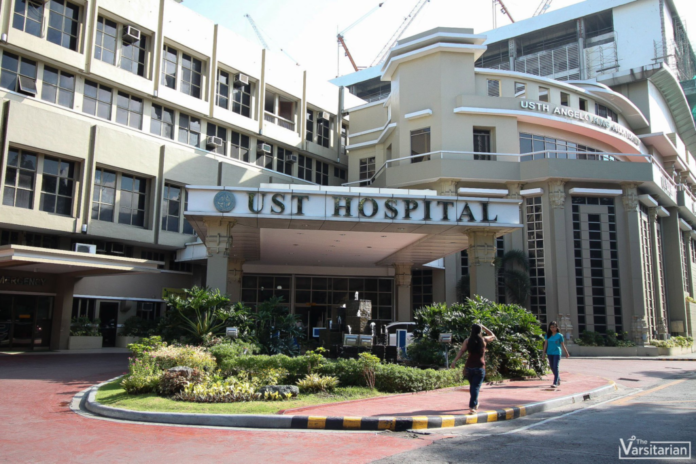THE PRIVATE Hospitals Association of the Philippines (PHAP) has defended the “cash-basis policy” of the University of Santo Tomas Hospital’s (USTH) clinical division, following reports of delayed treatments despite the passage of a stricter anti-hospital deposit law.
The cash-basis policy is necessary to stay afloat amid the heavy taxes imposed by the government, PHAP President Rusticio Jimenez said.
“We understand [the patients] but the problem is, BIR is also charging taxes. For example, ‘yong St. Luke’s, they were charged P50 million by BIR, and these cases are done by charity. Wala nang sinasanto ngayon ang BIR e,” he said in an interview.
“The hospital has the right to charge and be paid. It’s not a one-sided affair. So if you are in doubt, you think you cannot be admitted in a private hospital, do not go to a private hospital. Go to a government hospital,” he added.
Contrary to the “charge to bill” process in the hospital’s private division, the Clinical Division of USTH requires patients to pay first before undergoing any procedure. This policy delays treatment, with some patients staying in the Emergency Room for hours without undergoing any procedure, a source told the Varsitarian.
A medical trainee in the University hospital’s semi-private division said admission policies in the Clinical Division are discussed with patients.
“Many people often still mistake it as the charity division, that medical consults are subsidized and that indigent patients need not spend for anything to get urgent medical attention,” the trainee, who requested not to be named, told the Varsitarian.
The trainee said that while it might seem “cold-hearted” to discuss money with families of patients who needed urgent medical attention, it was better than having patients who could not go home because they could not settle their hospital debts.
One patient admitted at a ward has been in the hospital for more than five months. But despite being stable, the patient could still not leave the hospital because their hospital bill has reached more than 400,000 pesos, which continues to increase as they stay longer in the hospital.
“E kung di sila papayag [sa promissory note], anong gagawin? Sabihin ko na lang sa kanila, sige iwan na lang dito. E wala akong pambigay,” the patient’s mother said.
“Sometimes, the patients’ condition gets worse due to the relatives’ inability to provide medications or procedures,” the trainee said. “There are even cases when a family is forced to let go of a critically ill patient, let the natural course of a disease take over, since the medical management needed is draining the family financially.”
However, a wife of a regular patient in the USTH’s clinical division told the Varsitarian that despite the cash-basis policy, the treatment in the hospital is still worth their money.
“Sinabi nila ‘yon na hindi naman ‘to charity na lahat ng ipapagawang laboratory, babayaran. Minsan ‘di na namin pinapagawa kapag wala kaming pera,” she said. “’Pag kailangang kailangang gawin, pinapakiusap namin sa kanila. Pumapayag naman sila, minsan `yung mga doktor ang nag-aabono.”
‘USTH doctors competent’
Benjamin Quito, cardiologist at USTH, said the doctors live up to the principles of the University whatever the hospital policy was.
“If the condition is life-threatening, the procedure must be done at all costs without pay,” he said. “UST is a Catholic university [that] gives compassionate care. The doctors are highly competent and caring. I understand why the hospital is implementing [this policy].”
Jimenez said doctors were trained to stabilize patients whose cases were “between life and death” before transferring them to a government hospital.
“We are doing everything for emergency cases, but I have to tell you, not all cases na sinasabi ng patient na emergency, ay emergency,” he said.
New provisions in the law
Republic Act (RA) 10932 or the Strengthened Anti-Hospital Deposit Law, which was passed in August 2017, imposes stricter penalties on hospitals that refuse treatment of emergency patients who cannot give advanced payments.
Aside from the increase in penalty, which was hiked to P100,000 to P300,000 from the previous P100,000 to P200,000 pesos, pregnancy was added to the conditions covered by the law.
“Because back then, there’s a query about that: How about the pregnant women? Are they considered emergency cases? No, it wasn’t in the definition. So now, it was added,” Nelson Logronio, faculty member of the Faculty of Civil Law, said in an interview.
Logronio cited “non-institutional delivery” as another provision that was added and defined in the new law, as pregnant women, even if not in a state of emergency, must be admitted by the hospital.
The Strengthened Anti-Hospital Deposit Law also views the hospital as a “business entity,” Logronio added.
The law requires the state-owned Philippine Health Insurance Corp. (PhilHealth) to reimburse the cost of the basic emergency care and transportation services given by the hospital to poor and indigent patients.
If a violation is committed pursuant to hospital policy, the management, director or officer “responsible for the formulation and implementation of such policy” may be imprisoned from four to six years, be fined 500,000 to P1 million, or both. After three violations, the Department of Health (DOH) can revoke the health institution’s license to operate.
‘Information campaign’
Anthony Leachon, UST alumnus and PhilHealth independent director, urged the DOH to carry out an information campaign so that stakeholders, including private hospitals, would fully understand the law and avoid bankruptcy and medico-legal cases.
“Doctors are trained to be compassionate but they are not owners of the hospitals. I suggest a full information campaign should be triggered by DOH before rolling out the law,” he told the Varsitarian.
Logronio said there was an immediate need for this law as the last anti-hospital deposit law was passed 20 years ago.
RA 10932 strengthens RA 8344 passed in 1997, which amended the 1984 Batas Pambansa 702 or “An Act Prohibiting the Demand of Deposits or Advance Payments for the Confinement or Treatment of Patients in Hospitals and Medical Clinics in Certain Cases.”
“Imagine, 1997—that was 20 years ago. It needed to be amended because it was a long time ago [since it was last improved],” he said. With reports from L.C.L. Penera
To investigate and expose unspoken issues and anomalies, send confidential news tips to the Special Reports team of the Varsitarian at specialreports.varsitarian@gmail.com or at THE VARSITARIAN office, Rm. 105, Tan Yan Kee Student Center, University of Santo Tomas, España, Manila.


















